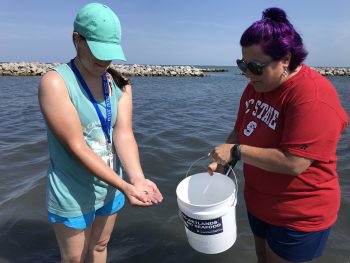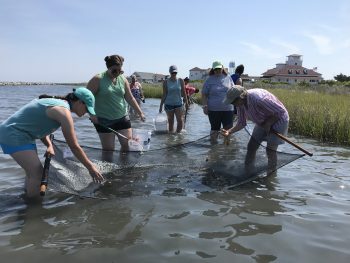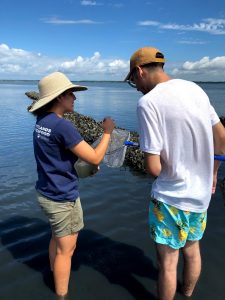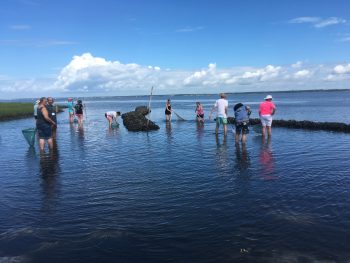This summer, the northeast office and the central office each hosted a teacher workshop. Teachers across North Carolina were immersed in the North Carolina Coastal Federation’s work and they learned how to connect their students to the coast.
NC Center for the Advancement of Teaching

NC Center for the Advancement of Teaching
In late June, Sara Hallas, coastal education coordinator for the Wanchese office, led a full day of sessions for 22 teachers from across North Carolina during a professional development seminar on Ocracoke. The North Carolina Center for the Advancement of Teaching hosted the group for five days, with a focus on connecting science and social studies to literacy standards. The federation’s northeast staff helped with the installation of a living shoreline on campus that creates a perfect opportunity for an outdoor classroom and continued partnership with the teaching center.
The first part of the day was spent leading the teachers through a variety of hands-on activities that showed how science standards could be taught through teaching literacy. As elementary teachers are pressured for time to include all the subjects, combining efforts helps tremendously. The teachers learned about the importance of living shorelines, estuaries and oyster restoration as well as the challenges of erosion and stormwater runoff. After spending the week on the Pamlico Sound, the teachers were pleased to both learn more about their surroundings as well as ways they can share this knowledge and appreciation with their own students.

NC Center for the Advancement of Teaching
One of the participants shared, “My way of thinking about the coastal system has been completely changed. I never really thought about being part of the problem but now I do because we saw first-hand what affects our actions have on the environment.”
The rest of the time was spent exploring the living shoreline on site. The teachers waded through the marsh grass to make observations and to collect and release some of the aquatic inhabitants. As many of the teachers are from non-coastal counties, this was quite a thrilling experience. As the teachers were enjoying the experience, they were also realizing how much their students would appreciate going on a similar field trip too.
Another participant shared, “I found, more than anything, the hands-on exploration helped me to see the kinds of activities I could bring to my students that would both cause excitement and meet the criteria of the standard.”
At Water’s Edge Teacher Institute

At Water’s Edge Teacher Institute
In early July, Rachel Bisesi, coastal education coordinator for the Ocean office, led a half-day session for educators who were part of the At Water’s Edge Teacher Institute. This program is organized by UNC’s Institute for the Environment and held at Trinity Center in Pine Knoll Shores each summer. This year,20 8th-12th grade science teachers took part in the week-long workshop. Throughout the week, educators are provided an opportunity to explore coastal ecosystems and learn about how they can connect their students to the coast once returning to the classroom.

At Water’s Edge Teacher Institute
During the federation’s session, Rachel presented on several educational resources, including curriculum focused on oysters, marine debris, living shorelines, and water quality. One teacher, Susan Perry, expressed that “I learned several activities that I can take back to my class. I really like the lesson about building living shorelines.”
Teachers also had a chance to explore a living shoreline the federation helped build at Trinity Center several years ago, using it as a living classroom. Jodi Maxey, who teaches at South Lenior High School mentioned that “The fascinating biodiversity of coastal organisms, including green shrimp, indicated both the health of the estuary and the value of the oyster reefs created by the North Carolina Coastal Federation. I never could have explained this to my students without this first-hand experience.”
